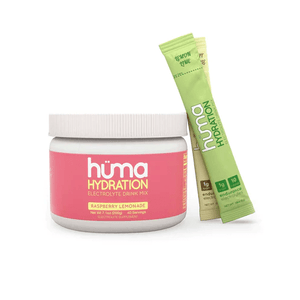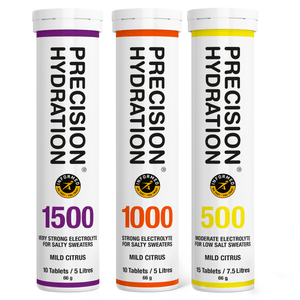It’s your choice - with our knowledge.

Product Insights
Discover more about the products in this article

SLT07 Hydration Drink Tablets
Featured Products
The Art of Staying Hydrated During Workouts
Maintaining proper hydration during exercise is crucial for runners and endurance athletes of all kinds.
If you’re an athlete then you probably already know why hydration is so important. But if not, we’re here to explain and help you build a hydration plan that works for you.
What causes dehydration?
Dehydration occurs when you lose more fluids and electrolytes than you are taking in. For a runner this is usually due to sweating during intense activity, and not drinking enough water or replacing electrolytes.
Human’s have evolved to sweat to control our body temperatures. When we run our body temperature increases and so we sweat to cool ourselves down. However, when we sweat we are also losing electrolytes like Sodium.
Sodium:
Our sweat contains Sodium, which is the main electrolyte found in the blood and aids many functions in our bodies such as:
- Absorption of nutrients in the gut
- Cognitive Function
- Muscle Contraction
- Maintains Fluid Balance
Sodium makes up 15-20% of extracellular fluid in the body, so it’s very important. Everybody loses different amounts of Sodium through their sweat, but it can range from 200-2000mg per litre.
Losing too much Sodium without replacing it creates an increased strain on the body, leading to fatigue, muscle cramps, and in severe cases nausea and vomiting.
Maintaining Sodium Levels:
Maintaining sodium levels should be the key focus of your hydration plan. Our bodies can’t produce an endless supply of sodium so we have to top up with electrolyte replacements. Of course, it is important to drink water but without additional sodium you risk becoming Hyponatraemic.
Hyponatremia- A condition that occurs when the blood sodium level becomes too low. Drinking too much water can cause Hyponatremia as the blood sodium becomes diluted.
Crafting the Perfect Hydration Plan:
Nutrition is never one size fits all and that is even more true with hydration. There are many factors that go into crafting your perfect hydration plan which can vary massively from person to person.
Here are a few things to consider that will be personal to you:
- Sweat rate: Everyone sweats at a different rate.
- Sodium sweat concentration: Everyone loses a different amount of sodium through their sweat, some people are saltier than others.
- Tolerance: Everyone can tolerate different levels of dehydration.
You should try to understand how the above apply to you, and from there you can build your plan.
Sweat Testing:
Trying to figure out your own sweat rate and sodium sweat concentration might seem a bit daunting but there are ways you can do this at home. For sweat rate you will need to monitor your body weight and fluid intake, for sodium concentration this involves more observation.
There are plenty of guides for this online, however you may prefer to take a sweat test facilitated by hydration experts. These are offered by companies like Precision Fuel & Hydration, who provide sweat testing at various locations across the UK and beyond.
Build a Basic Framework:
As we’ve said already, your hydration strategy should be tailored to your specific needs. This is why we can’t provide a rigid plan that you should stick to.
Instead, we recommend that you create a basic framework to follow that is flexible enough to adjust as you go.
When building your framework here are some things to think about:
- Past Experience: What have you done in the past, what worked and what didn’t? Trial & Error is key to personalising your routine.
- Start Hydrated: This is probably the most important thing you can do to ensure you stay hydrated and achieve your best performance. Ideally you will drink an electrolyte drink high in sodium either the night before or morning of your event (or even better, both).
- Duration: How long is the event? For shorter events 60-90 mins it is usually enough just to sip water to thirst. For events up to 4 hours in length you will want to replenish electrolytes and replace lost sodium. For longer distances it’s recommended that athletes drink no more than 750ml per hour- this should be an electrolyte drink and not just plain water.
- Weather Conditions: In hot weather you will be sweating more and may need to rehydrate even during shorter events.
- Are you going to be running again soon after?
- How much access will you have to water and supplements during the event?
Using these points you can build a basic flexible plan that can be adapted to any event.
What Hydration Products Should I Use?
When it comes to hydration products, there are so many options it can be a bit overwhelming knowing where to start.
The majority of products you will find aimed at hydration are drink mix powders, dissolvable drink tabs, and electrolyte capsules.
Because there is so much choice out there, we’ve put together a list of some of the hydration products we think you should try.
Best Electrolytes: STYRKR SLT07 Quad-Blend Electrolytes
- 360mg Sodium, 280mg Potassium, 20mg Calcium, 11mg Magnesium.
Best Low-Calorie: Huma Hydration Low-Calorie Drink Mix
- 380mg Sodium, 100mg Potassium, 40mg Magnesium, 25mg Calcium.
Best for Range: Precision Fuel & Hydration Electrolyte Drink Tablets
- 125mg to 1500mg Sodium Per litre, 125mg Potassium, 24mg Calcium, 12mg Magnesium.
Designed for Ironman: 226ERS SUB09 Salts Electrolytes
- 250mg Sodium, 54mg Potassium, 18mg Magnesium, 2.5mg Calcium.
Best Selling Chews: SaltStick Fastchews
- 100mg Sodium, 30mg Potassium, 10mg Calcium, 6mg Magnesium.
Best Additional Benefit: Active Root Electrolite
- 320mg Sodium, 204mg Ginger - Ginger helps keep a stomach settled during exercise.
So to recap, hydration is personal. All you really need to know is the basics of how hydration works, and your personal hydration needs. Once you have both of these, you should be able to create your perfect plan to stay hydrated during exercise.
It’s your choice - with our knowledge.














































































































